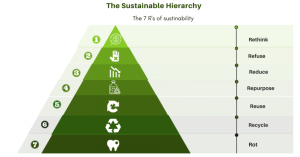Earth Day is a wonderful opportunity to show our appreciation for our planet and take actions that contribute to its well-being. By incorporating sustainable habits we can have a collective and positive impact for Earth Day and every day.

Let us delve into the 7 R’s of Sustainability, which provide a comprehensive framework for minimizing waste and promoting a more environmentally conscious lifestyle. These principles guide us toward sustainable practices and responsible resource management:
- Rethink: Before making any purchase, pause and consider whether you truly need the item. Impulse buying often leads to unused products that end up in landfills. For instance, close to 50% of all food in North America is discarded, even though it’s still edible. Be mindful of grabbing groceries or other items without a clear purpose. Ask yourself:
- What is the purpose of this item?
- How many times will I use it?
- Can it be recycled, or will it end up in the landfill?
- Can I repurpose something I already have instead of buying new?
- Refuse: Decline unnecessary freebies and items that you won’t use. Whether it’s extra napkins at fast-food restaurants or promotional giveaways, saying no helps reduce clutter and prevents unnecessary waste. Politely refuse and keep unnecessary items out of landfills.
- Reduce: This familiar principle encourages us to minimize what we bring into our homes. Consider investing in durable, reusable alternatives that last longer. By reducing consumption, you not only decrease waste but also save money in the long run. Examples of reducing include:
- Bringing your own reusable shopping and produce bags when shopping.
- Opting for sustainable kitchen and bathroom swaps to avoid disposable items.
- Invest in a reusable cup for beverages (insulated tumblers are great for keeping beverages at the right temperature for longer!).
- Repurpose: Instead of discarding items, find creative ways to repurpose them. Can an old piece of furniture be transformed into something new? Can you use glass jars for storage? Can this be donated? Repurposing extends the lifespan of objects and reduces waste.
- Reuse: Before throwing something away, explore whether it can serve another purpose. Old clothes, containers, or household items can find new life with a little creativity. Reusing items reduces the need for new production and conserves resources.
Consider shopping at thrift stores first before purchasing new items:
-
- Save Money: Thrift stores are excellent places to find items you need at a discount.
- Environmental Impact: By shopping at thrift stores, you contribute to sustainability. The entire clothing production process consumes significant resources, including water and energy. For instance, it takes at least 400 gallons of water to grow enough cotton for one t-shirt, and a pair of jeans requires around 1,800 gallons. Additionally, pesticides used in cotton farming can contaminate water sources. By reusing pre-owned items, you help decrease the need for new production and reduce landfill waste.
- Hardly-Used or New Items: It’s not uncommon to find barely-used items or even brand-new items with tags still attached. Thrift stores often carry otherwise expensive items at a fraction of the price, especially if they’re located in upscale areas.
- Support Local Communities: When you shop at thrift stores, you’re directly supporting local communities. Many thrift shops are run by charitable or non-profit organizations, and the proceeds from sales often fund critical programs.
- Economical and Environmentally Conscious: Thrift stores allow you to be both economical and environmentally conscious. You can find affordable, durable, high-quality gifts while contributing to a good cause.
- Decrease Landfill Size: By choosing thrift stores, you actively participate in keeping used goods in circulation and out of landfills. This helps decrease the overall size of landfills and promotes responsible waste management.
- Recycle: Recycling is essential for diverting waste from landfills. Sort recyclables properly and participate in local recycling programs. Remember that not all materials are recyclable, so educate yourself on what can and cannot be recycled in your area – the more you learn about recycling and practice recycling, the easier it will be to quickly sort items and avoid “wishcycling”.
- Wishcycling, also known as aspirational recycling, refers to the well-intentioned but often misguided belief that something is recyclable, even when it is not. Many of us have been trained to recycle anything and everything that even remotely resembles plastic, cardboard, or paper. However, the reality is that far less is actually recyclable than we might think – this is why recycling is at the end of the sustainability hierarchy.
- Many municipalities also offer ‘Recycling Rodeos’ which allow residents to recycle more uncommonly recycled materials like batteries, ink and toner cartridges and other electronics.
- Rot: Composting organic waste is a powerful way to close the loop. Food scraps, yard trimmings, and other biodegradable materials can be turned into nutrient-rich soil. Consider starting a compost bin or using community composting services.
By embracing these 7 R’s, we contribute to a more sustainable future, reduce our environmental impact, and foster responsible living. 🌿🌎
